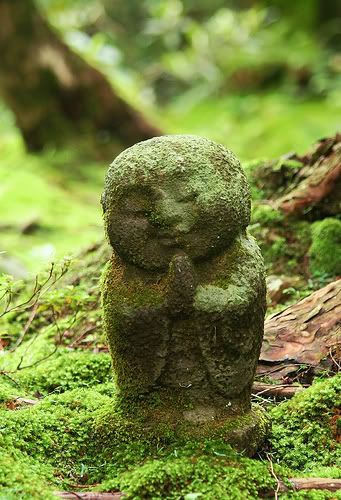Sekishin: There is the next grouping among the ‘Sixteen Great Boddhisattva Precepts’ ….. What do the ‘Three Universal Precepts’ entail?
Gudo: The ‘Three Universal Precepts’ are the precept to ‘Observe All Rules’ (jp: sh?ritsugikai), the precept to ‘Observe the Dharma’ (jp: sh?zenh?kai), and the precept to ‘Work for the Salvation of All Living Beings’ (jp: ny?yakushuj?kai) …..
The precept asking us to ‘Observe All Rules’ merely guides us to abide by, not only the Buddhist precepts, but all forms of rules and regulations of group life. Ordinary people, by the fact that we are people, do not live our lives fully independently and autonomously from each other, but are ‘social animals’ who must gather together as groups of individuals in our lives. Thereby, when we are living and working together, person to person, various rules and restrictions will naturally arise to govern interaction within the group. This precept recognizes that our abiding by such rules and restrictions is an indispensable fact of life for Buddhist followers.
Sekishin: But Roshi, whenever there are rules …… well, some laws and rules will be right and just, but some laws and rules will be wrong …..
Gudo: Of course - that is true. I did not mean to say that all rules and restrictions will be just and proper. This precept of ‘Observe All Rules’ is not asking us to follow blindly any rule or restriction simply because it is a rule or restriction …... Instead, it is a precept expressing that we should generally respect the rules and restrictions which govern and naturally must arise when human beings gather in groups, in society. There is a tendency among some political thinkers to assert that all rules and laws are but methods for the strong in society to oppress the weak, and that anything which could be termed a ‘rule’ or ‘restriction,’ just by bearing such name, should be ignored, overthrown. Such thinking is, I believe, simply not right, is overly inclusive and heavy handed.
Sekishin: May we discuss the precept to ‘Observe the Dharma?’
Gudo: The real meaning of ‘Observe the Dharma’ is to accept and incorporate within ourselves, to abide by the very order of the universe. It is the precept instructing us to study the order which is regulating this world of Reality, just as we have discussed today ….. or to say it in other words, to study Reality itself, as it is ….. and to uphold and abide by the lessons derived therefrom.
Sekishin: What is its relationship to the precept ‘Observe All Rules?’
Gudo: Well, the meaning of ‘Observe All Rules’ is to respect the rules and regulations which are existing around us, and ‘Observe the Dharma’ means, in a larger sense, to seek to study the order which is at the very root of the universe, and to re-evaluate and guide our daily lives based upon the standards garnered thereby. Accordingly, we might say that the precept ‘Observe the Dharma’ is more fundamental, more ‘at the root,’ in comparison to ‘Observe All Rules,’ and further, is providing us with supplemental details about how to live our life.
Sekishin: And what kind of precept is the precept to ‘Work for the Salvation of All Living Beings?’
Gudo: The meaning of ‘Work for the Salvation of All Living Beings’ is to seek to bestow benefit upon all forms of living things….. not just to seek selfishly to benefit ourselves, but instead, to act by giving thought to all living creatures, great and small, existing beyond our own narrow selves.
Sekishin: So, it is a most widely encompassing precept …..
Gudo: Yes. Among all the ‘Three Devotions’ and the ‘Three Universal Precepts,’ it is certainly a most encompassing and inclusive precept. The more detailed and specific a precept might be, the greater the likelihood that the precept will give rise to ill effects if it cannot be adapted to the different cultures, or to the norms of the different eras, in which it must be applied. Thereby, one of the wise points of all the Mahayana Boddhisattva Precepts is their flexibility and great inclusiveness.




 Reply With Quote
Reply With Quote

